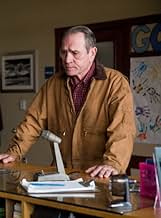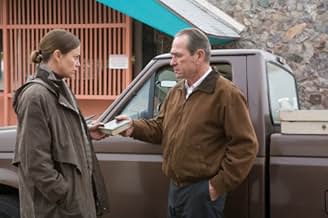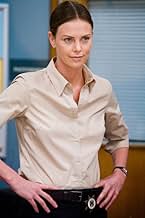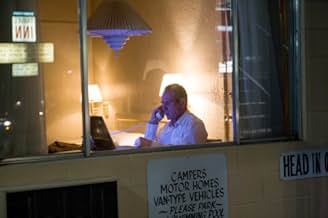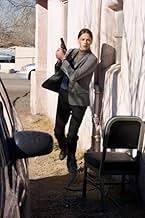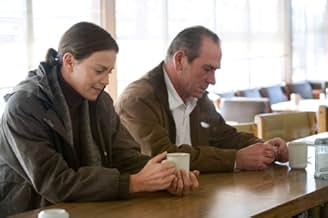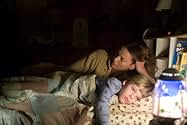AVALIAÇÃO DA IMDb
7,1/10
77 mil
SUA AVALIAÇÃO
Um investigador militar aposentado trabalha com um detetive da polícia para descobrir a verdade por trás do desaparecimento do seu filho.Um investigador militar aposentado trabalha com um detetive da polícia para descobrir a verdade por trás do desaparecimento do seu filho.Um investigador militar aposentado trabalha com um detetive da polícia para descobrir a verdade por trás do desaparecimento do seu filho.
- Direção
- Roteiristas
- Artistas
- Indicado a 1 Oscar
- 3 vitórias e 21 indicações no total
Roman Arabia
- Private Robert Ortiez
- (as Victor Wolf)
Greg Serano
- Detective Manny Nunez
- (as Greg Serrano)
Avaliações em destaque
Released in 2007 and directed & written by Paul Haggis, "In the Valley of Elah" is a crime drama/mystery inspired by the real-life case of Richard T. Davis. The story revolves around an elderly Tennessee couple (Tommy Lee Jones & Susan Sarandon) who get word that their son has gone missing from his base in New Mexico shortly after his return from Iraq. A retired military investigator, Hank Deerfield (Jones) goes to the base to find out the awful truth. Charlize Theron plays the civilian detective near the base who tries to help Hank while Jason Patric plays the Army counterpart. Josh Brolin is on hand as the town police chief.
This is a slow-burn mystery highlighted by great acting by the principles, especially Jones, and a thoroughly realistic story, which isn't surprising seeing as how it's based on true events. Speaking of which, I was surprised to find out that the basic details of the story are all accurate. The actual events took place in the Fort Benning area of Georgia rather than the fictitious Fort Rudd, NM.
The movie's not anti-Iraq War, but rather anti-PTSD; it merely reveals the awful truth about war in general: When we send our young men off to far-off lands where brutal warfare is normal they can bring that desensitized mentality back with them where the barbaric behavior that might be acceptable in war is anything but normal or conducive to a successful life, to say the least. Add the idiocy of alcohol abuse to the mix of PTSD and the results almost certainly WON'T be good.
The title refers to the valley where David, as a teen, fought and defeated the utterly intimidating Goliath from 1 Samuel 17.
ADDITIONAL ACTORS: James Franco, Wes Chatham, Jake McLaughlin, Mehcad Brooks and Roman Arabia play soldiers who knew Deerfield's son while Frances Fisher has a curious cameo (you'll know what I mean).
The film runs 121 minutes and was shot in Whiteville, Tennessee, and Albuquerque, New Mexico, with Morocco substituting for Iraq.
GRADE: B
This is a slow-burn mystery highlighted by great acting by the principles, especially Jones, and a thoroughly realistic story, which isn't surprising seeing as how it's based on true events. Speaking of which, I was surprised to find out that the basic details of the story are all accurate. The actual events took place in the Fort Benning area of Georgia rather than the fictitious Fort Rudd, NM.
The movie's not anti-Iraq War, but rather anti-PTSD; it merely reveals the awful truth about war in general: When we send our young men off to far-off lands where brutal warfare is normal they can bring that desensitized mentality back with them where the barbaric behavior that might be acceptable in war is anything but normal or conducive to a successful life, to say the least. Add the idiocy of alcohol abuse to the mix of PTSD and the results almost certainly WON'T be good.
The title refers to the valley where David, as a teen, fought and defeated the utterly intimidating Goliath from 1 Samuel 17.
ADDITIONAL ACTORS: James Franco, Wes Chatham, Jake McLaughlin, Mehcad Brooks and Roman Arabia play soldiers who knew Deerfield's son while Frances Fisher has a curious cameo (you'll know what I mean).
The film runs 121 minutes and was shot in Whiteville, Tennessee, and Albuquerque, New Mexico, with Morocco substituting for Iraq.
GRADE: B
This movie deals with the serious business of war and what it does to people.
It also deals with the anguish of parents, and how they try to deal with loss. When all is gone and there seems no point carrying on.
As well as this there is the military and how it deals with its image and the fragility of the men it must use.
The ex military father tries to find the truth behind his sons death. Despite him feeling he could do a better job than the police. Even he is caught out by the truth.
The movie is slow, and serious, and even disturbing at times. However, it always keeps you interested, and is a good watch; if you are in the right mood for it.
It also deals with the anguish of parents, and how they try to deal with loss. When all is gone and there seems no point carrying on.
As well as this there is the military and how it deals with its image and the fragility of the men it must use.
The ex military father tries to find the truth behind his sons death. Despite him feeling he could do a better job than the police. Even he is caught out by the truth.
The movie is slow, and serious, and even disturbing at times. However, it always keeps you interested, and is a good watch; if you are in the right mood for it.
I just saw this film and consider it to be one of the best anti-war films I've seen in quite a long time. And that makes me wonder at what the various critics are thinking. Roger Ebert gets it right, but some film critics are far too dismissive of a very serious, important film. James Berardinelli, in particular, seems curiously _angry_ that this film depicts the moral degradation of war in a frank and honest fashion.
Berardinelli is basically wrong in every single thing he says about the film. Since this film is not a "politcal message" film, it has no requirement to "show both sides equally". It is a story about a group of soldiers basically driven beyond the area of traditionally human behavior. Berardinelli thinks that it's "obvious" that war changes the way people feel about their country.
I sense a person utterly detached from history when I read that. A recent study concluded that the English were, as a group, fairly happy during WWII, even when their nation was under attack. Why was that? Because they believed in what they were doing. The notion that war _necessarily_ results in moral breakdown is, while hardly novel, also not true. That is part of what is important about "Elah". Jones' character is a veteran of the Vietnam war, and is hardly a delicate flower when it comes to the matters of war and its effect on the psyche. And yet even he is floored at what the Iraq war has done to the soldiers.
It is easy for a film critic to simply reject what is essentially reporting on the state of the military today. That Berardinelli does so with such vitriol makes me guess that he is injecting his own bias into the review.
Berardinelli is basically wrong in every single thing he says about the film. Since this film is not a "politcal message" film, it has no requirement to "show both sides equally". It is a story about a group of soldiers basically driven beyond the area of traditionally human behavior. Berardinelli thinks that it's "obvious" that war changes the way people feel about their country.
I sense a person utterly detached from history when I read that. A recent study concluded that the English were, as a group, fairly happy during WWII, even when their nation was under attack. Why was that? Because they believed in what they were doing. The notion that war _necessarily_ results in moral breakdown is, while hardly novel, also not true. That is part of what is important about "Elah". Jones' character is a veteran of the Vietnam war, and is hardly a delicate flower when it comes to the matters of war and its effect on the psyche. And yet even he is floored at what the Iraq war has done to the soldiers.
It is easy for a film critic to simply reject what is essentially reporting on the state of the military today. That Berardinelli does so with such vitriol makes me guess that he is injecting his own bias into the review.
This movie is just about perfect. I love how it starts as a genre movie and then transcends into something deeper and soul-searching. Some people just don't like Paul Haggis, but I'm not one of them. I think he's very smart here; he has no political point of view, he handles Charlize Theron perfectly, and the movie forces everybody to think about the troops in a way that isn't simply political rhetoric. I love that Tommy Lee Jones feels the way so many dads do. He's never been better. Watching the police work happen is interesting on it's own, but I like that Charlize Theron is just out to do the job correctly and just shrugs off the chauvinism coming at her from her department. The movie could've gone somewhere with that, but instead just quietly lets us in on it and moves on.
There have been many very good movies the last few years about Iraq-related themes, but I don't think there is a film that captures the feeling of the national mood as good as this one. It's drained of melodrama and just sort of moves forward on really good performances of the whole cast, who all act according to their natures instead of because of stupid plot requirements.
There have been many very good movies the last few years about Iraq-related themes, but I don't think there is a film that captures the feeling of the national mood as good as this one. It's drained of melodrama and just sort of moves forward on really good performances of the whole cast, who all act according to their natures instead of because of stupid plot requirements.
The big movies about the Vietnam war -- Apocalypse Now, Deer Hunter, Full Metal Jacket -- didn't reach the screen until about five years after the war ended. But movies dealing with Iraq and terrorism are cropping up all over even as this war still rages.
What exactly that means is hard to know, but it would seem to indicate that no matter which side of the issue they come down on, the filmmakers are willing to risk alienating about half the potential audience in an America more polarized today than at any point in our history.
"In the Valley of Elah" treads lightly on the politics for most of the movie, concentrating on the unfolding mystery of what happened to a young soldier who vanishes shortly after returning from a tour of duty in Iraq. Looking for answers are his father, a former sergeant in the Army's Criminal Investigation Division, and a young female civilian detective, who gets involved in the case, gets bounced off in a jurisdictional dispute, but winds up back on the case when its determined the crime took place off military property.
While director Paul Haggis gets uniformly good performances out of all the characters, the movie belongs to Tommy Lee Jones as the grieving father and Charlize Theron as the determined detective. Both turn in outstanding performances. Jones shines, playing a man who has spent his life holding in his emotions and can't change now, even as his world falls apart. Theron radiates strength as a woman trying to survive in a sexist police department where all her male colleagues are certain she slept her way into her detective's job. That is somewhat important to the story, because the movie provides a look into the lower class white community that provides the bulk of the recruits in the all volunteer army.
None of this really deals with the politics of the war, though, and it is not until the very end of the film that politics come into play, and even there, it is handled with great care. The message is more about the kind of war America finds itself fighting today and what that type of combat does to the men who engage in it. Unlike world wars one and two, Vietnam and Iraq are not wars between easily recognized enemies. We are not battling the Germans or the Japanese. In both Nam and Iraq, Americans find it is difficult to tell friend from foe. That means they often must make snap decisions that sometimes determine whether they themselves live or die. Needless to say, their decisions also determine the fate of the people in the sights of their weapons..
"In the Valley of Elah" does an excellent job of showing that post traumatic stress syndrome is not an oddity, but rather a growing problem in an army of young men whose job requires them to be quick on the trigger.
Every American should see this movie and then think long and hard about it.
What exactly that means is hard to know, but it would seem to indicate that no matter which side of the issue they come down on, the filmmakers are willing to risk alienating about half the potential audience in an America more polarized today than at any point in our history.
"In the Valley of Elah" treads lightly on the politics for most of the movie, concentrating on the unfolding mystery of what happened to a young soldier who vanishes shortly after returning from a tour of duty in Iraq. Looking for answers are his father, a former sergeant in the Army's Criminal Investigation Division, and a young female civilian detective, who gets involved in the case, gets bounced off in a jurisdictional dispute, but winds up back on the case when its determined the crime took place off military property.
While director Paul Haggis gets uniformly good performances out of all the characters, the movie belongs to Tommy Lee Jones as the grieving father and Charlize Theron as the determined detective. Both turn in outstanding performances. Jones shines, playing a man who has spent his life holding in his emotions and can't change now, even as his world falls apart. Theron radiates strength as a woman trying to survive in a sexist police department where all her male colleagues are certain she slept her way into her detective's job. That is somewhat important to the story, because the movie provides a look into the lower class white community that provides the bulk of the recruits in the all volunteer army.
None of this really deals with the politics of the war, though, and it is not until the very end of the film that politics come into play, and even there, it is handled with great care. The message is more about the kind of war America finds itself fighting today and what that type of combat does to the men who engage in it. Unlike world wars one and two, Vietnam and Iraq are not wars between easily recognized enemies. We are not battling the Germans or the Japanese. In both Nam and Iraq, Americans find it is difficult to tell friend from foe. That means they often must make snap decisions that sometimes determine whether they themselves live or die. Needless to say, their decisions also determine the fate of the people in the sights of their weapons..
"In the Valley of Elah" does an excellent job of showing that post traumatic stress syndrome is not an oddity, but rather a growing problem in an army of young men whose job requires them to be quick on the trigger.
Every American should see this movie and then think long and hard about it.
Você sabia?
- CuriosidadesThis film was originally a potential starring vehicle for Clint Eastwood, who directed Paul Haggis' screenplay for Menina de Ouro (2004). Eastwood turned it down, despite liking the script very much, and recommended his friend Tommy Lee Jones for the role of Hank Deerfield.
- Erros de gravaçãoThe opening subtitle says that the Deerfields live in "Munro, Tennessee", but the address on the side of Hank's truck says "Munroe, Tennessee".
- Citações
Chief Buchwald: But didn't you just say that you would do whatever you were told?
Det. Emily Sanders: Yeah, I sometimes exaggerate for effect.
- Trilhas sonorasShu44le
Written by Robin Davey and Jesse Davey
Performed by The Davey Brothers
Courtesy of The Davey Brothers
Principais escolhas
Faça login para avaliar e ver a lista de recomendações personalizadas
- How long is In the Valley of Elah?Fornecido pela Alexa
Detalhes
- Data de lançamento
- País de origem
- Centrais de atendimento oficiais
- Idioma
- Também conhecido como
- In the Valley of Elah
- Locações de filme
- Empresas de produção
- Consulte mais créditos da empresa na IMDbPro
Bilheteria
- Orçamento
- US$ 22.000.000 (estimativa)
- Faturamento bruto nos EUA e Canadá
- US$ 6.777.741
- Fim de semana de estreia nos EUA e Canadá
- US$ 133.557
- 16 de set. de 2007
- Faturamento bruto mundial
- US$ 29.541.790
- Tempo de duração
- 2 h 1 min(121 min)
- Cor
- Mixagem de som
- Proporção
- 2.35 : 1
Contribua para esta página
Sugerir uma alteração ou adicionar conteúdo ausente







